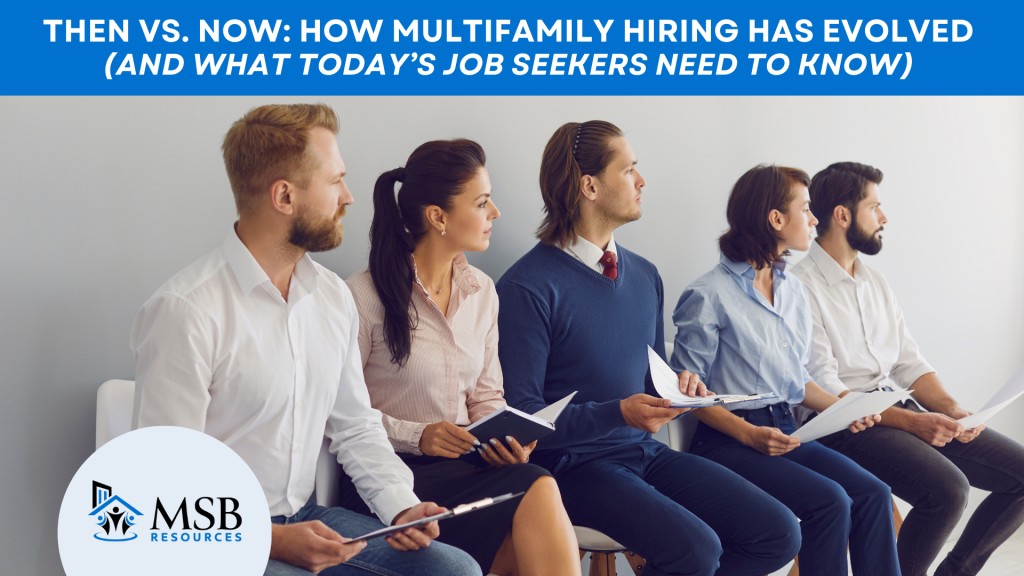Multifamily hiring has transformed from a basic paperwork process to a sophisticated talent strategy over the past 20 years. As MSB celebrates 20 years of connecting multifamily talent with opportunities across 49 states, we’ve had a unique vantage point to witness this evolution. Companies now seek candidates with technological fluency, cultural alignment, and adaptability rather than just technical skills. In this blog, we explore the dramatic shifts in multifamily recruitment and provide insights on what today’s job seekers need to know to stand out in this evolved landscape.

The Recruitment Process: Classifieds to Digital Networks
THEN:
Job searches in multifamily began with newspaper classified ads, where property management companies would list open positions with minimal details. Candidates mailed or faxed paper resumes to offices, often waiting weeks for a response. The candidate pool was severely limited by geographic proximity, with companies rarely considering talent outside their immediate area. Reference checks were conducted manually through phone calls, and screening required time-consuming in-person meetings.
NOW:
Today’s recruitment landscape is entirely digital. LinkedIn profiles and digital portfolios have replaced traditional resumes, allowing candidates to showcase achievements with greater impact. Sophisticated Applicant Tracking Systems now screen applications using keyword algorithms before human eyes ever see them. Virtual interviews connect talent regardless of geographic location, and employers utilize digital assessments to evaluate both technical skills and personality traits. In this evolved marketplace, 75% of job seekers consider an employer’s brand before applying, making online reputation critical. Companies aren’t just evaluating candidates—candidates are evaluating them, and those with strong employer brands enjoy a 50% reduction in cost per hire and 28% lower turnover rates.
Hiring Priorities: Skills vs. Cultural Alignment
THEN:
In the past, technical expertise and years of experience dominated hiring decisions in multifamily. Interviews primarily focused on verifying resume claims and checking qualification boxes. Cultural fit was evaluated through subjective impressions during brief in-person meetings, with little formal assessment. Employers highly valued career longevity at a single company, often viewing job changes with suspicion rather than as opportunities for growth.
NOW:
When evaluating candidates, today’s multifamily employers weigh cultural alignment equally with technical skills. Modern interviews utilize behavioral techniques that predict future performance by analyzing past behaviors. Organizations formally assess emotional intelligence, recognizing that interpersonal skills significantly impact team and resident satisfaction. Companies now prioritize candidates who demonstrate adaptability to change over those who are merely comfortable with the status quo.
Pro Tip: Research company values before interviews and prepare specific examples demonstrating how your approach aligns with their cultural priorities
Candidate Evaluation: Experience vs. Potential
THEN:
Direct multifamily experience was once mandatory for most roles, with hiring managers rarely considering candidates from outside the industry. Rigid industry silos prevented crossover from adjacent sectors like hospitality or retail, despite their relevant customer service foundations. Career paths were expected to follow linear trajectories within property management, and resume gaps were viewed with significant skepticism.
NOW:
Today’s multifamily employers increasingly value transferable skills from the hospitality and customer service sectors, recognizing that resident satisfaction shares many elements with guest experience. Learning agility often outweighs years of direct experience, with 90% of executives rating learning agility as a critical workforce capability. Organizations that emphasize adaptability report 25% higher profit margins than their competitors. Modern career paths include lateral moves that build diverse skillsets, and employers now recognize that problem-solving capabilities predict success better than perfect, gap-free resumes.
Technology Requirements: Basic vs. Digital Fluency
THEN:
Multifamily professionals once needed only basic computer skills to operate simple property management software. Daily operations centered around face-to-face resident interactions and paper-based processes. Marketing consisted primarily of print materials and newspaper advertising, with minimal digital presence. Technology training focused narrowly on operational necessities rather than strategic business applications.
NOW:
The modern multifamily environment requires proficiency across multiple property management platforms and digital tools. The industry has embraced virtual leasing, digital tours, and online resident portals as standard practice. Marketing now requires familiarity with integrated digital strategies and CRM systems to effectively attract and retain residents. Property managers increasingly rely on data analytics to drive pricing decisions and operational efficiencies, creating a need for higher levels of technological sophistication from all team members.
Pro Tip: Highlight specific software proficiencies on your resume along with measurable improvements you’ve achieved through technology implementation
Standing Out in Today’s Market
Optimize your LinkedIn profile with recommendations and industry-specific keywords to stand out in today’s multifamily job market. Demonstrate continuous learning through certifications and relevant courses that showcase your adaptability. Develop thought leadership through industry association involvement and quantify your achievements with specific metrics showing bottom-line impact. With 70% of employers now using social media to screen candidates and 57% finding content that caused them not to hire a candidate, maintaining a professional online presence is crucial. Building relationships across companies before you need them creates a valuable network for your next career move.
Final Thoughts: 20 Years of Multifamily Evolution
The multifamily industry has evolved from simply “renting apartments” to delivering sophisticated resident experiences that combine technology, service, and community. Throughout MSB’s 20-year journey of connecting talented professionals with multifamily organizations, we’ve seen the industry transform dramatically in hiring practices and talent needs. With over 1,300 placements and 600+ companies served, we’ve observed firsthand how successful candidates have adapted to these changing expectations and requirements.
Looking to advance your multifamily career in today’s evolved hiring landscape? Connect with MSB’s 20 years of industry expertise to position yourself as a top candidate. Contact us today to discuss your next career move!


